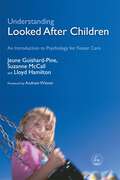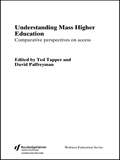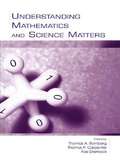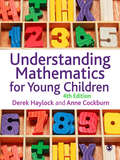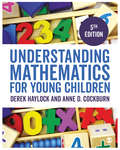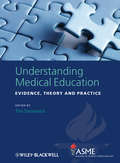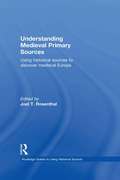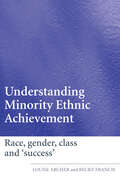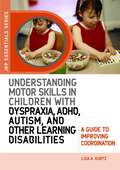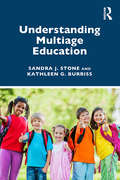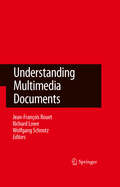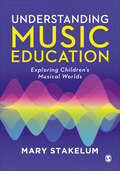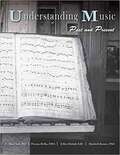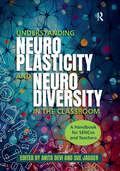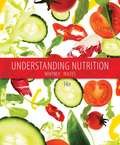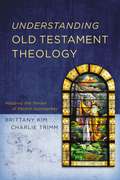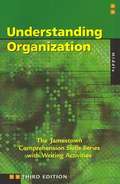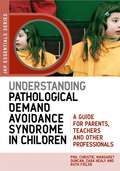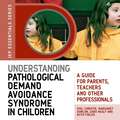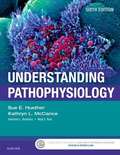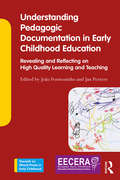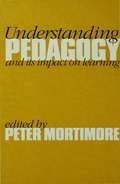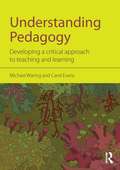- Table View
- List View
Understanding Looked After Children: An Introduction to Psychology for Foster Care
by Suzanne Mccall Lloyd Hamilton Jeune Guishard-PineUnderstanding Looked After Children is an accessible guide to understanding the mental health needs of children in foster care and the role of foster carers and support networks in helping these children. The authors provide foster carers with an insight into the psychological issues experienced by children in the care system, and the impact of these issues on the foster family. Chapters cover cultural, social and legal structures associated with foster care and both the relevant child psychology theory and examples drawn from real-life situations. The authors give advice on how to address common psychological issues in collaboration with multi-agency professionals, as well as how to access to statutory services. They also explain the possible impact of assessments on foster children and the causes and management of foster carers' own feelings of frustration, anger or disappointment with social and mental health services or the placement itself. Chapters are complemented by case studies, and the book includes a helpful glossary to common terminology. Understanding Looked After Children is essential reading for registered foster carers and those considering fostering, as well as adoptive parents, and a useful reference for trainee and experienced practitioners in the care system, including social workers, psychologists, counsellors, teachers and others looking after vulnerable children.
Understanding Mass Higher Education: Comparative Perspectives on Access
by David Palfreyman Ted TapperIn recent years most western democracies have experienced a shift from elite to mass higher education, with the United States leading the way. This text compares the experience of this very important social change within different nation states. Whilst recognising the critical global economic forces that appear to explain the international nature of the change, it sees the issues as rooted within different national traditions.There is a particular focus upon the discourse of access, especially the political discourse. The book addresses questions such as:* How has expansion been explained?* Has expansion been generated by state intervention or by a combination of economic and social forces?* What are the forms of political intervention?* What points of agreement and conflict are generated within the wider society by expanding access?Leading academic experts explore the ways in which different systems of higher education have accommodated mass access, constructing comparative pictures and comparative interpretations and lessons in an accessible and informative style. This book should be critical reading for students in education, sociology and politics, as well as policy-makers and academics.
Understanding Mathematics and Science Matters (Studies in Mathematical Thinking and Learning Series)
by Thomas A. Romberg, Thomas P. Carpenter and Fae DremockThe research reported in this book provides reliable evidence on and knowledge about mathematics and science instruction that emphasizes student understanding--instruction consistent with the needs of students who will be citizens in an increasingly demanding technological world.The National Center for Improving Student Learning in Mathematics and Science--established in 1996 as a research center and funded by the U.S. Department of Education--was instrumental in developing instructional practices supportive of high student achievement in and understanding of mathematics and science concepts. NCISLA researchers worked with teachers, students, and administrators to construct learning environments that exemplify current research and theory about effective learning of mathematics and science. The careful programs of research conducted examined how instructional content and design, assessment, professional development, and organizational support can be designed, implemented, and orchestrated to support the learning of all students. This book presents a summary of the concepts, findings, and conclusions of the Center's research from 1996-2001.In the Introduction, the chapters in Understanding Mathematics and Science Matters are situated in terms of the reform movement in school mathematics and school science. Three thematically structured sections focus on, respectively, research directed toward what is involved when students learn mathematics and science with understanding; research on the role of teachers and the problems they face when attempting to teach their students mathematics and science with understanding; and a collaboration among some of the contributors to this volume to gather information about classroom assessment practices and organizational support for reform.The goal of this book is to help educational practitioners, policymakers, and the general public to see the validity of the reform recommendations, understand the recommended guidelines, and to use these to transform teaching and learning of mathematics and science in U.S. classrooms.
Understanding Mathematics for Young Children
by Derek Haylock Anne CockburnIf you are a teacher or student teacher in a nursery or primary school, you need a secure understanding of the mathematical ideas behind the material you will use in the classroom. To help young children develop their understanding of mathematics, you need to develop your own understanding of how mathematics is learnt. <P><P> In this indispensible book, the authors help you to understand mathematical concepts and how children come to understand them, and also help develop your own confidence with mathematical activities. <P> Each chapter of this book includes:<P> - Real-life examples and illustrations from children and teachers in the classroom <P> - The research behind some of the concepts and teaching approaches discussed <P> - Pauses to reflect and discuss your own mathematical knowledge and experience <P> - Age-appropriate classroom activities to try with your class or group.
Understanding Mathematics for Young Children: A Guide for Teachers of Children 3-7
by Derek Haylock Professor Anne CockburnHaving a deep understanding of the mathematical ideas and concepts taught in the classroom is vital as a nursery or primary school teacher. In order for children to get to grips with these concepts, trainee teachers need to be aware of how they come to interpret and understand them. Now in its 5th edition, this essential book helps trainee teachers develop their own knowledge of key mathematical ideas and concepts for the nursery and primary classroom. Now focusing specifically on ages 3-7, it also supports trainees with several age-appropriate classroom activities. As well as updates to further reading suggestions and research focuses, this revised edition includes new content on: Mastery in learning mathematics Simple fractions Roman numerals Money as a form of measurement
Understanding Mathematics for Young Children: A Guide for Teachers of Children 3-7
by Derek Haylock Professor Anne CockburnHaving a deep understanding of the mathematical ideas and concepts taught in the classroom is vital as a nursery or primary school teacher. In order for children to get to grips with these concepts, trainee teachers need to be aware of how they come to interpret and understand them. Now in its 5th edition, this essential book helps trainee teachers develop their own knowledge of key mathematical ideas and concepts for the nursery and primary classroom. Now focusing specifically on ages 3-7, it also supports trainees with several age-appropriate classroom activities. As well as updates to further reading suggestions and research focuses, this revised edition includes new content on: Mastery in learning mathematics Simple fractions Roman numerals Money as a form of measurement
Understanding Medical Education
by Tim SwanwickFor the first time in a single core textbook, the Association for the Study of Medical Education presents a complete and authoritative guide to medical education. Written by leading experts in the field, Understanding Medical Education provides a comprehensive resource of the theoretical and academic bases to modern medical education practice.This accessible and timely reference is designed to meet the needs of all those working in medical education from undergraduate education through postgraduate training to continuing professional development. As well as providing practical guidance for clinicians, teachers and researchers, Understanding Medical Education will prove an invaluable resource to those studying at certificate, diploma or masters level and a first 'port-of-call' for anyone engaged in medical education as an academic discipline.Exploring medical education in all its diversity and containing all you need in one place, Understanding Medical Education is the ideal reference not only for medical educators, but for anyone involved in the development of healthcare professionals, in whatever discipline wherever they are in the world.An on-line edition of the complete book, together with individual chapter downloads, are available at www.wileymedicaleducation.comUnderstanding Medical Education has been brought together and edited by Professor Tim Swanwick, Director of Professional Development in the London Deanery, Visiting Fellow at the Institute of Education and Visiting Professor of Medical Education at the University of Bedfordshire.
Understanding Medieval Primary Sources: Using Historical Sources to Discover Medieval Europe (Routledge Guides to Using Historical Sources)
by Joel T. RosenthalMedieval society created many kinds of records and written material which differ considerably, giving us such sources as last wills, sermons, manorial accounts, or royal biographies. Primary sources are an exciting way for students to engage with the past and draw their own ideas about life in the medieval period. Understanding Medieval Primary Sources is a collection of essays that will introduce students to the key primary sources that are essential to studying medieval Europe. The sources are divided into two categories: the first part treats some of the many generic sources that have been preserved, such as wills, letters, royal and secular narratives and sermons. Chapter by chapter each expert author illustrates how they can be used to reveal details about medieval history. The second part focuses on areas of historical research that can only be fully discovered by using a combination of primary sources, covering fields such as maritime history, urban history, women’s history and medical history. Understanding Medieval Primary Sources will be an invaluable resource for any student embarking on medieval historical research.
Understanding Minority Ethnic Achievement: Race, Gender, Class and 'Success'
by Becky Francis Louise ArcherProviding fresh insights and understandings about educationally ‘successful’ minority ethnic pupils, this book examines the views, identities and educational experiences of those pupils who are undoubtedly ‘achieving’, but who tend to remain ignored within popular concerns about under-achievement. Combining a broad analysis of minority ethnic pupils’ achievement together with a novel, detailed case study of an educationally ‘successful’ group, the British-Chinese, this book examines a fascinating angle on debates about the reproduction of social inequalities. In this thought-provoking and highly accessible book, the authors: review the theoretical and policy context to issues of ‘race’, gender, social class and achievement discuss the role of teachers and schools explore Chinese parents’ views of their children’s education and explain how these families ‘produce’ and support achievement investigate British-Chinese pupils’ views on their approaches to learning and their educational identities examine the relationship between aspirations and educational achievement consider the complexity and subtlety of racisms experienced by ‘successful’ minority ethnic pupils. This timely and authoritative book contributes to the ongoing debates about levels of achievement among minority ethnic pupils and is an essential book for all researchers, students, education professionals and policy-makers.
Understanding Motor Skills in Children with Dyspraxia, ADHD, Autism, and Other Learning Disabilities: A Guide to Improving Coordination
by Lisa A. Kurtz'The book is user-friendly and includes clear diagrams in each section, along with tables to outline key points. I found these very useful and they are an easy reference/ reminder, for example, they include a normal development chart, what assessments are available and their main aims.' - National Association of Paediatric Occupational Therapists Coordination problems often make everyday activities a challenge for children with learning disabilities. This accessible manual offers practical strategies and advice for helping children with coordination difficulties. The author explains how to recognize normal and abnormal motor development, when and how to seek help, and includes specific teaching strategies to help children with coordination difficulties succeed in the classroom, playground, and home. She describes a wide range of therapeutic methods and provides a comprehensive list of resources. Full of practical help, this is essential reading for anyone caring for, or working with, children with developmental motor concerns.
Understanding Multiage Education
by Sandra J. Stone Kathleen G. BurrissPresenting a compelling case for changing our system of education from a graded, curriculum-centered approach to a multiage, child-centered approach, Understanding Multiage Education is a comprehensive exploration of the philosophy and foundations of multiage education. Veteran educators Stone and Burriss examine the "why" of multiage education, exploring how multiage classrooms' structure, environment, strategies, and assessments unfold and complement the multiage philosophy and pedagogy. Delineating the differences between a standard and a mixed-age approach, each chapter features Inside Insights, short vignettes, case studies, examples of multiage in practice and discussion questions challenging readers to engage with the core concepts and examine how we might define success in a multiage classroom. Designed for graduate-level students of early childhood, elementary, and general education courses, as well as experienced practitioners, this is an essential guide for anyone interested in understanding the rationale, implementation, and benefits of multiage education.
Understanding Multimedia Documents
by Richard Lowe Jean-Francois Rouet Wolfgang SchnotzProfessionals who use multimedia documents as a tool to communicate concepts will find this a hugely illuminating text. It provides a comprehensive and up to date account of relevant research issues, methodologies and results in the area of multimedia comprehension. More specifically, the book draws connections between cognitive research, instructional strategies and design methodologies. It includes theoretical reviews, discussions of research techniques, ad original experimental contributions. The book highlights essential aspects of current theories, and trends for future research on the use of multimedia documents.
Understanding Music Education: Exploring Children′s Musical Worlds
by Mary StakelumThis book is a contemporary analysis of children’s music education, combining theoretical insight with practical application. It examines how children engage with, and think about, music and how an understanding of this can empower rich approaches to teaching and learning. Key topics include: an overview of music education as a field of study, musical imagination in thought and practice, musical worlds created with, and for, children and a range of perspectives on musicality and musical knowledge in childhood. This is essential reading for anyone involved in music education with children, including music leaders working in community settings, and for primary school teachers, and those training to teach, seeking to deepen their own professional understanding. Mary Stakelum is Area Leader, Music Education at the Royal College of Music.
Understanding Music Education: Exploring Children′s Musical Worlds
by Mary StakelumThis book is a contemporary analysis of children’s music education, combining theoretical insight with practical application. It examines how children engage with, and think about, music and how an understanding of this can empower rich approaches to teaching and learning. Key topics include: an overview of music education as a field of study, musical imagination in thought and practice, musical worlds created with, and for, children and a range of perspectives on musicality and musical knowledge in childhood. This is essential reading for anyone involved in music education with children, including music leaders working in community settings, and for primary school teachers, and those training to teach, seeking to deepen their own professional understanding. Mary Stakelum is Area Leader, Music Education at the Royal College of Music.
Understanding Music: Past and Present
by N. Alan Clark Thomas Heflin Jeffrey Kluball Elizabeth KramerThe benefits of music in our lives are increasingly acknowledged by researchers and scientist. As human beings, we have taken the existence of music for granted and rarely think critically about music and its purpose. Perhaps for this reason, such critical thinking about music is sometimes perceived as difficult. Understanding Music: Past and Present creates a roadmap from some of the earliest known origins of music to modern day. This linear approach allows the reader to trace the history and evolution of music through the ages. Understanding Music: Past and Present is designed to grow the reader’s appreciation of music through improved understanding and listening skills, allowing the reader to develop his or her own informed opinions and express them. <p><p> Sponsored by eCore: eCore is a collaborative program that supports online core courses for students from twenty-five University System of Georgia colleges and universities. In an effort to decrease out-of-pocket costs for students in higher education, eCore Curriculum & Instruction has made great strides over the last few years to design, develop, and adopt Open Educational Resources into the curriculum offerings. eCore partners with the University of North Georgia Press and Affordable Learning Georgia to provide no-cost and low-cost textbooks and materials to its students. OERs are currently available in most of eCore’s twenty-six course offerings, with a goal to implement OERs into 100% of the course offerings.
Understanding Neuroplasticity and Neurodiversity in the Classroom: A Handbook for SENCos and Teachers
by Anita Devi Sue JaggerA unique and innovative book for all teachers and SENCos that explores the intersection of neurodiversity and neuroplasticity in order to provide better outcomes for neurodivergent pupils.Neurodiversity involves an understanding that neurological differences should be honoured and respected. It is a strengths-based model based on the idea that people experience and interact with the world around them in many different ways, advocating that there is no single right way of thinking, learning, and behaving. In effect, neurodiversity can be used as a construct to understand those ‘labelled’ with a special educational need and disability. Neuroplasticity is the brain’s ability to change and adapt in response to experiences, especially important for children who struggle to learn.This book unravels how teachers can contribute to rewiring neural pathways to reshape as opposed to ‘fix’, demonstrating how making new connections in the brain enables pupils to realise their full potential. Rich with research, case studies, and thought-provoking questions, this book sheds light on an innovative and timely topic.As the demand for teacher support in this area grows, it helps practitioners identify alternative approaches for those who might need more personalised learning and teaching in the classroom.
Understanding Nutrition: Fourteenth Edition
by Ellie Whitney Sharon Rady RolfesMore than one million readers make UNDERSTANDING NUTRITION the best-selling introductory nutrition book on the market today! Now in its 14th Edition, this book maintains the quality and support that discerning readers demand in nutrition applications and science that are ideal at introductory levels. New and updated topics refresh every chapter, along with the emphasis on active learning, assignable content, and integrated resources that help you advance your knowledge and career. Connecting with you through an approachable writing style, UNDERSTANDING NUTRITION, 14th Edition includes twenty chapters on topics such as diet planning, macronutrients, vitamins and minerals, diet and health, fitness, life span nutrition, food safety, and world hunger, among others. Combined with a carefully developed art program and a variety of interactive activities, UNDERSTANDING NUTRITION, 14th Edition continues to set the standard for introductory nutrition texts.
Understanding Old Testament Theology: Mapping the Terrain of Recent Approaches
by Brittany Kim Charlie TrimmThe discipline of Old Testament theology seeks to provide us with a picture of YHWH and his relationship to the world as described in the Old Testament. But within this discipline, there are many disagreements about the key issues and methodologies:Is the Old Testament unified in some way?Should the context of the theologian play a role in interpretation?Should Old Testament theology merely describe what ancient Israel believed, or should it offer guidance for the church today?What is the relationship between history and theology?All these considerations and more result in so many different kinds of Old Testament theologies (and so many publications), that it's difficult for students, pastors, and laity to productively study this already complex field.In Understanding Old Testament Theology, professors Brittany Kim and Charlie Trimm provide an overview of the contemporary approaches to Old Testament theology. In three main sections, they explore various approaches:Part I examines approaches that ground Old Testament theology in history.Part II surveys approaches that foreground Old Testament theme(s).Part III considers approaches that highlight different contexts for doing Old Testament theology.Each main chapter describes both common features of the approach and points of tension and then offers a test case illuminating how it has been applied to the book of Exodus.Through reading this book, you&’ll hopefully come to see the Old Testament in a fresh light—as something that&’s alive and active, continually drawing us into deeper encounters with the living God.
Understanding Organization (The Jamestown Comprehension Skills Series with Writing Activities #Third Edition)
by McGraw-Hill Editors<P>Understanding Organization <P> The Jamestown <P>Comprehension Skills Series with Writing Activities
Understanding Pathological Demand Avoidance Syndrome in Children: A Guide for Parents, Teachers and Other Professionals
by Phil Christie Margaret Duncan Ruth Fidler Zara HealyThis straightforward guide offers a complete overview of Pathological Demand Avoidance Syndrome (PDA) and gives practical advice for overcoming the difficulties it poses in a wide range of contexts from diagnosis through to adulthood. Starting with an exploration into the background of PDA that answers many of the immediate questions triggered when a child is first diagnosed, the book goes on to look at the impact of the condition on different areas of the child's life and what can be done to help. The authors present useful information on early intervention options and workable strategies for managing PDA positively on a day-to-day basis. They also examine ways to minimize common difficulties that may be encountered at home and school, making life easier for the child, family and peers. The final chapters tackle new problems that can arise when the teenage years hit and how to assist a successful transition from adolescence to adulthood. Illustrative case examples are included throughout, and the book concludes with a list of valuable resources for further information and advice. Full of helpful guidance and support, this user-friendly introductory handbook is essential reading for anyone caring for, or working with, children with PDA.
Understanding Pathological Demand Avoidance Syndrome in Children: A Guide for Parents, Teachers and Other Professionals (JKP Essentials)
by Phil Christie Margaret Duncan Ruth Fidler Zara HealyStraightforward guide to understanding PDA for anyone needing an overview of the condition. Pathological Demand Avoidance Syndrome (PDA) is a developmental disorder that is being increasingly recognised as part of the autism spectrum. The main characteristic is a continued resistance to the ordinary demands of life through strategies of social manipulation, which originates from an anxiety-driven need to be in control.This straightforward guide is written collaboratively by professionals and parents to give a complete overview of PDA. Starting with an exploration into the syndrome, it goes on to answer the immediate questions triggered when a child is first diagnosed, and uses case examples throughout to illustrate the impact of the condition on different areas of the child's life. Early intervention options and workable strategies for managing PDA positively will make day-to-day life easier for the child, their family and peers. New problems faced in the teenage years and how to assist a successful transition from adolescence to adulthood are also tackled. The book concludes with a valuable resources list.Full of helpful guidance and support, this user-friendly introductory handbook is essential reading for families, carers and anyone who knows a child with PDA.(P) 2021 Hodder & Stoughton Ltd
Understanding Pathophysiology
by Sue E. Huether Kathryn L. McCanceMaster the important pathophysiology concepts you need to know with the most engaging and reader-friendly text available. Filled with vibrant illustrations and complemented by online resources that bring pathophysiology concepts to life, Understanding Pathophysiology, 6th Edition continues its tradition of delivering the most accurate information on treatments, manifestations, and mechanisms of disease across the lifespan, giving you the fundamental knowledge needed to move forward in your nursing education and career. New additions include a new chapter on epigenetics, new content on rare diseases, a separate chapter for male and female reproductive alterations, streamlined features, simplified language, and fully updated information throughout.
Understanding Pedagogic Documentation in Early Childhood Education: Revealing and Reflecting on High Quality Learning and Teaching (Towards an Ethical Praxis in Early Childhood)
by Jan Peeters Joao FormosinhoMuch more than simply recording events, pedagogical documentation is a revolutionary educational approach that enables practitioners to capture and understand the ways in which children learn and think. Exploring the use of pedagogic documentation across five different cultures, this book offers a unique insight into the conditions and methods through which pedagogical documentation might become an effective means of connecting teaching and learning. By drawing on theory, research-based evidence and practice, Understanding Pedagogic Documentation in Early Childhood Education reveals pedagogic documentation as an instigator for critical reflection on practice, for the creation of new pedagogical approaches and improvements in quality. Observing and documenting the lived educational experience of children and practitioners is emphasised as a means of acknowledging their voice and rights, of revealing their knowledge, their competences, their attitudes and dispositions to learning. Offering contextualised approaches and considering the challenges involved in observing and documenting day-to-day practice in early childhood settings, chapters encourage professionals to reflect and recognise the value of documentation for children, staff members and the wider community. Making a crucial contribution to the debates on pedagogical documentation, Understanding Pedagogic Documentation in Early Childhood Education offers researchers, students, policy-makers and professionals a comprehensive, and multicultural perspective on pedagogical documentation.
Understanding Pedagogy: And Its Impact on Learning
by Professor Peter Mortimore`This presents a useful and thoughtful overview of the ways in which thinking about pedagogy has changed in research and practice' - Dr A Loveless, University of Brighton `I commend it to anyone with a concern for teaching in any of its forms' - School Leadership and Management In this controversial book, Peter Mortimore and a team from London University's Institute of Education explore what is meant by the term pedagogy.They investigate its context and describe some of the recent shifts in thinking about it. Pedagogy affects the way hundreds of thousands of learners of different ages and stages are taught. Yet, until recently, it has been a neglected topic. Instead of having access to systematic evidence about its impact, innovative teachers have been guided only by ideological positions, folk wisdom and fashionable enthusiasms for particular approaches. The contributors to this book, all with professional backgrounds as teachers, have scoured the literature to examine the impact of different pedagogies on nursery, primary and secondary schools as well as on further education colleges, universities and the workplace. The book also considers learners with special educational needs and the implications of using information and communications technology. The authors open up debates on the following key topics: · how best to define pedagogy · what we know about the impact of particular pedagogies on learning what is still not known · whether there are important differences between the pedagogy used for learners of different ages and stages · whether any lessons for the future can be gleaned from current practice. This important book is invaluable reading for interested teachers working with learners of all ages.The issues raised affect the way we think about the teaching of the under fives through to university students and continuing lifelong learners. It is essential reading for policymakers, practitioners and tutors.
Understanding Pedagogy: Developing a critical approach to teaching and learning
by Carol Evans Michael WaringWhat is meant by pedagogy? How does our conception of pedagogy inform good teaching and learning? Pedagogy is a complex concept of which student and practising teachers need to have an understanding, yet there remain many ambiguities about what the term means, and how it informs learning in the classroom. Understanding Pedagogy examines pedagogy in a holistic way, supporting a more critical and reflective understanding of teaching and learning. It considers pedagogy as a concept that covers not just teaching approaches and pupil-teacher relationships but one which also embraces and informs educational theory, personal learning styles, assessment, and relationships inside and outside the classroom.? A detailed consideration of what it means to be a professional in the contemporary climate, Understanding Pedagogy?challenges student and practising teachers to reappraise their understanding and practice through effectively linking theory and practice. Key issues explored include the importance of understanding a learning styles profile, the application of cognitive neuroscience to teaching, personalised learning, assessment and feedback, and what we mean by critical reflection. Using the Personal Learning Styles Pedagogy, the authors make explicit the integration of theory and practice and the many decisions and selections that teachers make, their implications for what is being taught and learnt, how learners are positioned in the pedagogical process, and ultimately, how learning can be improved. Understanding Pedagogy will be essential reading for student and practising teachers, as well those on Education Studies courses and undertaking masters level courses, involved in the endeavour of understanding what constitutes effective teaching and learning.
